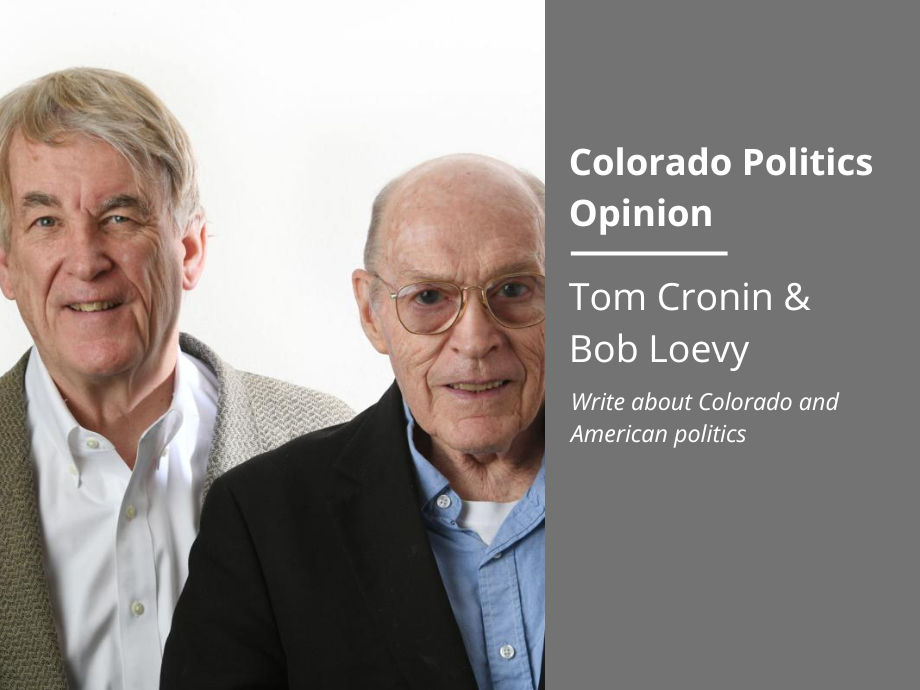Evaluating the idea of Elon Musk’s America Party | CRONIN & LOEVY

Tom Cronin and Bob Loevy
The United States has had a long history as a two-party electoral system. But many, if not most, Americans are unhappy with what looks like a tired and worn-out party system, where the two old political parties are bankrupting the country.
Elon Musk, the world’s richest man and a famously successful business disruptor and innovator, believes his new third political party, the America Party, is needed to address the country’s urgent financial problems.
His party is still unofficial, still organizing and still working on its platform.
As we discuss below, many others have tried, and failed, but Musk has some distinctive advantages that could help him succeed in founding a new third party in the United States.
First, his enormous wealth will allow him to largely self-fund his initial efforts.
Second, he owns the most influential social media bullhorn in his X.
Third, he says he will focus, at least in 2026, on just a dozen pivotal races.
Fourth, he has more name recognition than any other previous third-party leader apart from Teddy Roosevelt, who ran unsuccessfully on a third- party ticket in 1912.
Stay up to speed: Sign up for daily opinion in your inbox Monday-Friday
Media commentators say Elon Musk does not have a clear program. But this is not true. Musk’s program is to reduce the nation’s enormous national public debt and move toward a balanced national budget.
He also wants to reduce government regulations he believes restrict the entrepreneurial initiative of American businesses.
He also favors more aggressive campaigns to eliminate waste in the operations of the United States government. He also wants a more AI enhanced military — and to expand the country’s birth rate.
And, finally, he is decidedly a champion of anti-woke politics in the United States. He claims he is aiming to win over the 80% in America’s partisan middle, but Republicans understandably fear it will hurt them politically.
Musk’s own public approval ratings are low, yet most of his policy priorities enjoy considerable public approval. And he will not be running.
The major effect of third-party campaigns is almost always to split the voter support of one of the two major parties and guarantee the electoral victory of the other major party.
In most cases, if it had not split in two, the party that broke apart would have easily won the election.
There has only been one exception in United States electoral history to this rule, and that was in 1860 when the Democratic Party split in two and a brand-new political party, the Republican Party, won the presidency and replaced the Whig Party as the second major political party.
But third political parties can play a key role in United States history. They can introduce and develop new and compelling issues which gain popularity and are then taken over by one of the two major political parties and passed into law.
Here is a quick look at political parties throughout U.S. history:
Thomas Jefferson founded the Democratic-Republican Party at the time of the 1800 presidential election and rode it into the White House. The supporters of former presidents George Washington and John Adams clarified their position as the Federalist Party in response.
The Federalist Party presented itself as the party of the well-born and well- connected. Thomas Jefferson styled his Democratic-Republicans as the party of the “yeoman farmer.”
The Federalist Party got itself in trouble by backing the British in the War of 1812. By 1828, under the leadership of military-hero president Andrew Jackson, the Democratic-Republicans evolved into the Democratic Party we know today and became the party of the “common man,” which now included tradesmen and workers in cities as well as farmers.
The Whig Party was now well-established as the nation’s second political party. It elected its first president in 1840 in the person of William Henry Harrison, like Andrew Jackson a military hero from the War of 1812 who won the battle of Tippecanoe.
Jackson’s Democrats and Harrison’s Whigs were a good example of a functioning two-party system in the United States. A famous Whig leader who often ran for U.S. president but was never elected was Henry Clay.
Throughout the 1840s and 1850s, the issue of freeing the African slaves in the southern United States began to divide both the Democratic and the Whig parties.
A third political party, the Republican Party, formed to oppose the expansion of human slavery into the new territories acquired by the United States in the Mexican War in 1848.
Republican Abraham Lincoln was elected president in 1860 and the Republican Party ousted the Whig Party as the second major political party in the United States. Note both a hugely divisive issue — the freeing of the African slaves, who were a vital part of the economy in the southern states — followed by a four-year Civil War were required to make a third party successful at becoming a second party.
A classic example of a third-party candidate in American politics was Theodore Roosevelt in 1912. A former Republican president, he became disillusioned with his Republican successor, William Howard Taft, and ran against Taft as the Bull Moose candidate.
The net result of Teddy Roosevelt’s effort was to defeat Taft and put Democrat Woodrow Wilson in the White House.
Another example of a third-party candidate for president was Henry Wallace in 1948. Under the banner of the Progressive Party, he ran mainly as a socialist candidate, and some charged him with being a communist.
Henry Wallace drew a very small percentage of the vote. Typical of third-party candidates, however, Henry Wallace advocated controversial issues that later were enacted into law, such as racial desegregation of public schools, gender equality and a national health insurance program.
Yet another third-party candidate was George Wallace, the governor of Alabama, who established himself as the outspoken opponent of the 1954 Supreme Court decision racially desegregating public schools in the United States.
He was the American Independent Party candidate for president in 1968 and carried five southern states in the election. Republican Richard Nixon won the White House over civil rights champion and Democrat Hubert Humphrey.
Political analysts continue to debate whether George Wallace’s third-party campaign in 1968 split the Democratic Party and thereby elected Republican Richard Nixon president.
Consumer protection lobbyist Ralph Nader ran several times as a third-party candidate. Many people believe his running in 2000 had the effect of hurting Democrat Al Gore’s chances of winning in the crucial Florida race that year. Democrats have accused Nader of being a “spoiler” when he, in effect, narrowly helped elect Republican George W. Bush president.
The third-party leader who has the most in common with Elon Musk is Ross Perot, a billionaire Texas businessman who ran on the “Reform Party” ticket in 1992 and 1996.
Perot won nearly 20% of the vote in 1992 and doubtless was a key factor in hurting the chances of Republican president George H.W. Bush being reelected president. Clinton won a three-way race.
Ross Perot’s major policy issue was to balance the budget and drastically reduce the national debt. His was a feisty campaign, and he helped a few other Reform Party candidates get elected around the nation.
But Perot’s Reform Party petered out as the two major parties adopted watered down versions of his ideas. As more than one commentator has said: “Third parties are a lot like bees. Once they have stung, they die.”
Questions need to be asked:
First, is the United States as divided politically over Donald Trump and his presidency here in 2025 as it was in 1860, when the third-party Republicans won the presidency and established themselves as the new second party?
Second, is talented and eccentric Elon Musk, who has never won or held an elective office, the right person to stage a successful third-party campaign for president at this point in American history?
Third, pundits admire Musk’s business success yet believe he is easily distracted when it comes to politics. He will find, as previous reformers have found, state election laws make it very hard for third parties to qualify for the ballot.
Finally, Musk may find the already existing Libertarian Party an ideal companion and could end up using their existing electoral scaffolding to launch his embryo party.
Tom Cronin and Bob Loevy write about Colorado and American politics.
Colorado Politics Must-Reads:












